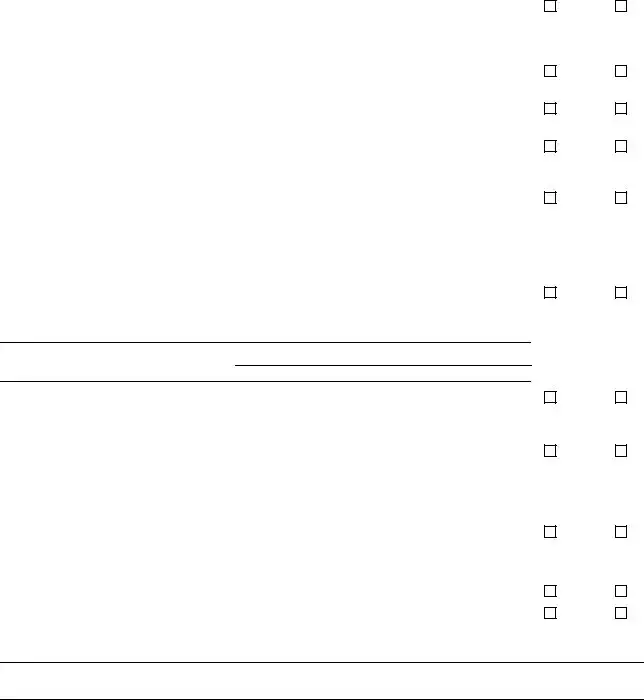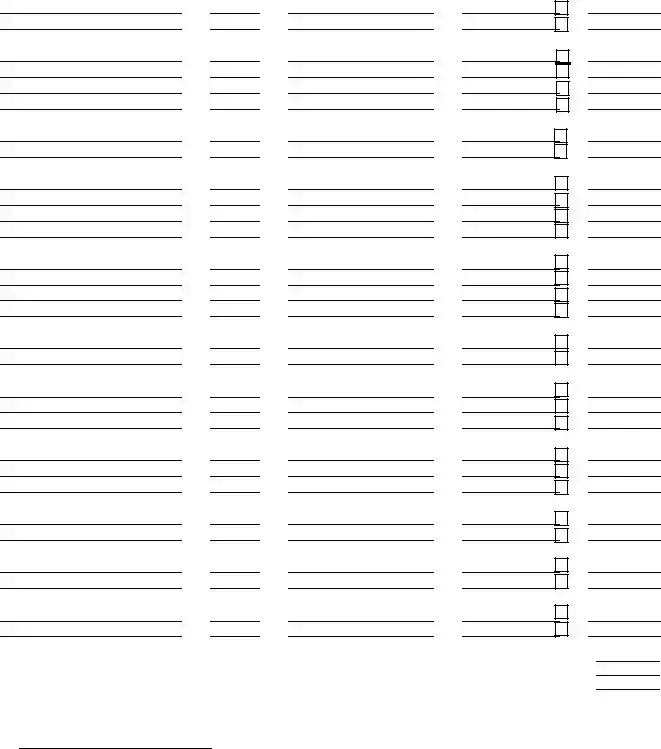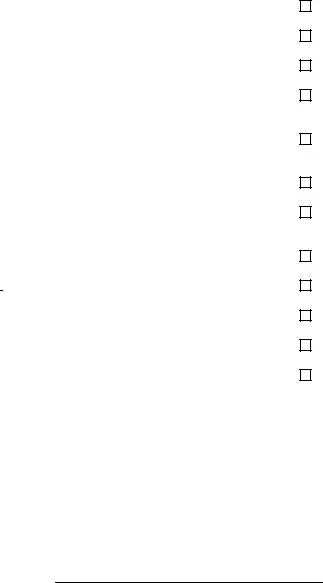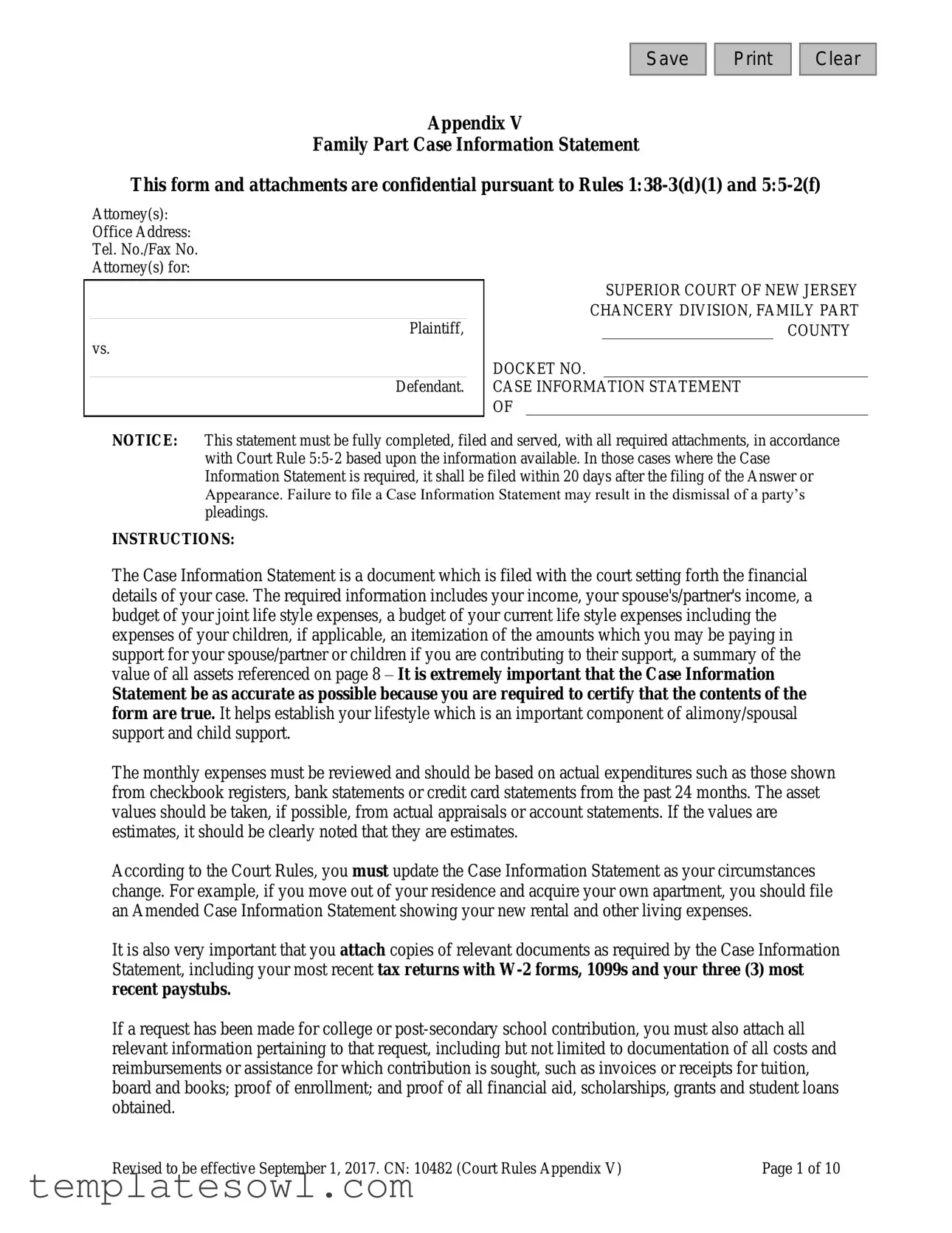Fill Out Your Nj Cn 10482 Form
The NJ CN 10482 form, known as the Case Information Statement, serves a vital function in family law matters within New Jersey’s court system. This form outlines essential financial details pertinent to ongoing family-related cases such as divorce, child support, alimony, and equitable distribution. Individuals must fully complete and submit this statement within 20 days after filing their answer or appearance in a case. It is important to note that failure to submit this form may lead to dismissals of specific pleadings. The form requires detailed information including income—both earned and unearned—for all parties involved, monthly expense budgets, and a comprehensive overview of assets. Moreover, individuals must provide accurate documentation to support their claims, which may include tax returns, pay stubs, and records of expenses related to children’s education. Importantly, any changes in circumstances should be reflected by filing an updated Case Information Statement to ensure the court has the most current information when making its determinations. The confidentiality of the form is guarded under New Jersey court rules, ensuring that sensitive information remains secure. In navigating family law issues, being thorough and precise with the NJ CN 10482 form can significantly affect the outcomes of cases.
Nj Cn 10482 Example

Save
Appendix V
Family Part Case Information Statement
Clear
This form and attachments are confidential pursuant to Rules
Attorney(s):
Office Address:
Tel. No./Fax No.
Attorney(s) for:
Plaintiff,
vs.
Defendant.
SUPERIOR COURT OF NEW JERSEY
CHANCERY DIVISION, FAMILY PART
COUNTY
DOCKET NO.
CASE INFORMATION STATEMENT
OF
NOTICE: This statement must be fully completed, filed and served, with all required attachments, in accordance with Court Rule
INSTRUCTIONS:
The Case Information Statement is a document which is filed with the court setting forth the financial details of your case. The required information includes your income, your spouse's/partner's income, a budget of your joint life style expenses, a budget of your current life style expenses including the expenses of your children, if applicable, an itemization of the amounts which you may be paying in support for your spouse/partner or children if you are contributing to their support, a summary of the value of all assets referenced on page 8 – It is extremely important that the Case Information
Statement be as accurate as possible because you are required to certify that the contents of the form are true. It helps establish your lifestyle which is an important component of alimony/spousal support and child support.
The monthly expenses must be reviewed and should be based on actual expenditures such as those shown from checkbook registers, bank statements or credit card statements from the past 24 months. The asset values should be taken, if possible, from actual appraisals or account statements. If the values are estimates, it should be clearly noted that they are estimates.
According to the Court Rules, you must update the Case Information Statement as your circumstances change. For example, if you move out of your residence and acquire your own apartment, you should file an Amended Case Information Statement showing your new rental and other living expenses.
It is also very important that you attach copies of relevant documents as required by the Case Information Statement, including your most recent tax returns with
If a request has been made for college or
Revised to be effective September 1, 2017. CN: 10482 (Court Rules Appendix V) |
Page 1 of 10 |

Part A - Case Information: |
Issues in Dispute: |
|||||||||||||
Date of Statement |
|
Cause of Action |
|
|||||||||||
Date of Divorce, Dissolution of Civil |
Custody |
|
||||||||||||
Union or Termination of Domestic |
|
|
Parenting Time |
|
||||||||||
Partnership |
Alimony |
|
||||||||||||
Date(s) of Prior Statement(s) |
Child Support |
|
||||||||||||
|
|
|
|
|
|
|
Equitable Distribution |
|
||||||
Your Birthdate |
|
Counsel Fees |
|
|||||||||||
Birthdate of Other Party |
|
Anticipated College/Post- |
||||||||||||
Date of Marriage, or entry into Civil Union |
Secondary Education |
|||||||||||||
or Domestic Partnership |
|
|
Expenses |
|
||||||||||
|
|
|
|
|
|
|
Other issues (be specific) |
|||||||
Date of Separation |
|
|
|
Date of Complaint |
|
|
|
Does an agreement exist between parties relative to any issue? |
Yes |
No. |
|
If Yes, ATTACH a copy (if written) or a summary (if oral). |
|
|
|
1.Name and Addresses of Parties: Your Name
Street Address |
|
City |
|
State/Zip |
|
||
Email: |
|
|
|
|
|
||
Other Party’s Name |
|
|
|
|
|
||
Street Address |
|
City |
|
State/Zip |
|
||
Email: |
|
|
|
|
|
||
2.Name, Address, Birthdate and Person with whom children reside: a. Child(ren) From This Relationship
Child’s Full Name |
|
Address |
|
Birthdate |
|
Person’s Name |
|
|
|
|
|
|
|
|
|
|
|
|
|
|
|
|
|
|
|
|
|
|
|
|
|
|
|
|
b. Child(ren) From Other Relationships |
|
|
|
Child’s Full Name |
Address |
Birthdate |
Person’s Name |
Part B - Miscellaneous Information:
1. Information about Employment (Provide Name & Address of Business, if |
|
|
|
|
||||||||||
Name of Employer/Business |
|
|
|
|
Address |
|
|
|
|
|
||||
Name of Employer/Business |
|
|
|
|
Address |
|
|
|
|
|
||||
|
|
|
|
|
|
|
|
|||||||
|
|
|
|
|
|
|
|
|||||||
2. Do you have Insurance obtained through Employment/Business? |
|
Yes |
No. |
Type of Insurance: |
|
|
||||||||
Medical |
Yes |
No; Dental |
Yes |
No; Prescription Drug |
Yes |
No; Life |
Yes |
No; Disability |
Yes |
No |
||||
Other (explain) |
|
|
|
|
|
|
|
|
|
|
|
|
||
Is Insurance available through Employment/Business? |
Yes |
|
No |
|
|
|
|
|
||||||
Explain: |
|
|
|
|
|
|
|
|
|
|
|
|
|
|
Revised to be effective September 1, 2017. CN: 10482 (Court Rules Appendix V) |
Page 2 of 10 |

3.ATTACH Affidavit of Insurance Coverage as required by Court Rule
4.Additional Identification:
Confidential Litigant Information Sheet: Filed |
Yes |
No |
5.ATTACH a list of all prior/pending family actions involving support, custody or Domestic Violence, with the Docket Number, County, State and the disposition reached. Attach copies of all existing Orders in effect.
Part C. - Income Information:
Complete this section for self and (if known) for other party. If
1. Last Year’s Income
|
|
|
Yours |
|
Joint |
Other Party |
|
1. |
Gross earned income last calendar (year) |
$ |
|
$ |
|
$ |
|
2. |
Unearned income (same year) |
$ |
|
$ |
|
$ |
|
3. |
Total Income Taxes paid on income (Fed., State, |
$ |
|
$ |
|
$ |
|
|
F.I.C.A., and S.U.I.). If Joint Return, use middle |
|
|
|
|
|
|
|
column. |
|
|
|
|
|
|
4. |
Net income (1 + 2 - 3) |
$ |
|
$ |
|
$ |
|
ATTACH to this form a corporate benefits statement as well as a statement of all fringe benefits of employment. (See Part G)
ATTACH a full and complete copy of last year’s Federal and State Income Tax Returns. to show total income plus a copy of the most recently filed Tax Returns. (See Part G) Check if attached: 





ATTACH
Other |
2. Present Earned Income and Expenses
|
|
|
|
|
Yours |
|
Other Party |
|
|
|
|
|
|
|
(if known) |
1. |
Average gross weekly income (based on last 3 pay periods – |
$ |
|
$ |
|
||
|
ATTACH pay stubs) |
|
|
|
|
|
|
|
Commissions and bonuses, etc., are: |
|
|
|
|
|
|
|
included |
not included* |
not paid to you. |
|
|
|
|
*ATTACH details of basis thereof, including, but not limited to, percentage overrides, timing of payments, etc. |
|
|
|||||
ATTACH copies of last three statements of such bonuses, commissions, etc. |
|
|
|
|
|||
2. |
Deductions per week (check all types of withholdings): |
$ |
|
$ |
|
||
|
Federal |
|
State |
|
F.I.C.A. |
3. Net average weekly income (1 - 2)
S.U.I.
Other
$ |
|
$ |
3. Your Current
|
|
|
|
Provide Dates: From |
|
To |
||||
1. GROSS EARNED INCOME: $ |
|
|
Number of Weeks |
|
|
|||||
2. TAX DEDUCTIONS: (Number of Dependents: |
|
) |
|
|
|
|
|
|
||
a. |
Federal Income Taxes |
|
a. |
$ |
|
|
|
|
||
b. |
N.J. Income Taxes |
|
b. |
$ |
|
|
|
|
||
c. |
Other State Income Taxes |
|
c. |
$ |
|
|
|
|
||
d. |
F.I.C.A. |
|
d. |
$ |
|
|
|
|
||
e. |
Medicare |
|
e. |
$ |
|
|
|
|
||
f. |
S.U.I. / S.D.I. |
|
f. |
$ |
|
|
|
|
||
g. |
Estimated tax payments in excess of withholding |
|
g. |
$ |
|
|
|
|
||
h. |
|
|
|
|
h. |
$ |
|
|
|
|
i. |
|
|
|
|
i. |
$ |
|
|
|
|
|
|
|
|
|
|
|
|
|||
|
|
|
|
|
|
|
|
|
|
|
|
|
|
|
TOTAL |
$ |
|
|
|
|
|
Revised to be effective September 1, 2017. CN: 10482 (Court Rules Appendix V) |
Page 3 of 10 |

3. GROSS INCOME NET OF TAXES $ |
|
$ |
|
|
||||
4. OTHER DEDUCTIONS |
|
|
|
If mandatory, check box |
||||
a. |
Hospitalization/Medical Insurance |
a. |
$ |
|
|
|||
b. |
Life Insurance |
b. |
$ |
|
|
|||
c. |
Union Dues |
c. |
$ |
|
|
|||
d. |
401(k) Plans |
d. |
$ |
|
|
|||
e. |
Pension/Retirement Plans |
e. |
$ |
|
|
|||
f. |
Other Plans - specify |
f. |
$ |
|
|
|||
|
|
|
|
|
|
|
|
|
g. |
Charity |
g. |
$ |
|
|
|||
h. |
Wage Execution |
h. |
$ |
|
|
|||
i. |
Medical Reimbursement (flex fund) |
i. |
$ |
|
|
|||
j. |
Other: |
j. |
$ |
|
|
|||
|
|
|
|
|
|
|
|
|
|
|
|
TOTAL |
|
$ |
|
|
|
5. NET |
|
$ |
|
|
|
|||
NET AVERAGE EARNED INCOME PER MONTH: |
|
$ |
|
|
|
|||
NET AVERAGE EARNED INCOME PER WEEK |
|
$ |
|
|
|
|||
4. Your
(including, but not limited to, income from unemployment, disability and/or social security payments, interest, dividends,
rental income and any other miscellaneous unearned income)
Source |
|
How often paid |
Year to date amount |
||
|
|
|
$ |
|
|
|
|
|
$ |
|
|
|
|
|
$ |
|
|
|
|
|
$ |
|
|
|
|
|
$ |
|
|
|
|
|
$ |
|
|
|
|
|
$ |
|
|
|
|
|
$ |
|
|
|
|
|
$ |
|
|
TOTAL GROSS UNEARNED INCOME YEAR TO DATE |
|
|
$ |
|
|
5. Additional Information:
1. |
How often are you paid? |
|
|
|
|
|
|
|
|
2. |
What is your annual salary? |
$ |
|
|
|
|
|
||
3. |
Have you received any raises in the current year? |
Yes |
No |
||||||
|
If yes, provide the date and the gross/net amount. |
|
|
|
|||||
4. |
Do you receive bonuses, commissions, or other compensation, including distributions, taxable or non- |
Yes |
No |
||||||
|
taxable, in addition to your regular salary? |
|
|
||||||
|
If yes, explain: |
|
|
|
|
|
|
|
|
5. |
Does your employer pay for or provide you with an automobile (lease or purchase), automobile expenses, |
Yes |
No |
||||||
|
gas, repairs, lodging and other. |
|
|
|
|
|
|
||
|
If yes, explain.: |
|
|
|
|
|
|
||
|
|
|
|
|
|
|
|
|
|
Revised to be effective September 1, 2017. CN: 10482 (Court Rules Appendix V) |
Page 4 of 10 |

6. |
Did you receive bonuses, commissions, or other compensation, including distributions, taxable or non- |
Yes |
No |
||
|
taxable, in addition to your regular salary during the current or immediate past 2 calendar years? |
|
|
||
|
If yes, explain and state the date(s) of receipt and set forth the gross and net amounts received: |
|
|
||
|
|
|
|
|
|
7. |
Do you receive cash or distributions not otherwise listed? |
Yes |
No |
||
|
If yes, explain. |
|
|
|
|
8. |
Have you received income from overtime work during either the current or immediate past calendar year? |
Yes |
No |
||
|
If yes, explain. |
|
|
||
9. |
Have you been awarded or granted stock options, restricted stock or any other |
Yes |
No |
||
|
entitlement during the current or immediate past calendar year? |
|
|
||
|
If yes, explain. |
|
|
|
|
10. |
Have you received any other supplemental compensation during either the current or immediate past calendar |
Yes |
No |
||
|
year? |
|
|
||
|
If yes, state the date(s) of receipt and set forth the gross and net amounts received. Also describe the nature |
|
|
||
|
of any supplemental compensation received. |
|
|
||
|
|
|
|
||
|
|
|
|
||
11. |
Have you received income from unemployment, disability and/or social security during either the current or |
Yes |
No |
||
|
immediate past calendar year? |
|
|
||
|
If yes, state the date(s) of receipt and set forth the gross and net amounts received. |
|
|
||
12.List the names of the dependents you claim:
13. |
Are you paying or receiving any alimony? |
Yes |
No |
|
|
If yes, how much and from or to whom? |
|
|
|
|
|
|
|
|
14. |
Are you paying or receiving any child support? |
Yes |
No |
|
|
If yes, list names of the children, the amount paid or received for each child and to whom paid or from whom |
|
|
|
|
received. |
|
|
|
|
|
|
|
|
|
|
|
|
|
15. |
Is there a wage execution in connection with support? |
Yes |
No |
|
|
If yes explain. |
|
|
|
16. |
Does a Safe Deposit Box exist and if so, at which bank? |
Yes |
No |
|
17. |
Has a dependent child of yours received income from social security, SSI or other government program |
Yes |
No |
|
|
during either the current or immediate past calendar year? |
|
|
|
|
If yes, explain the basis and state the date(s) of receipt and set forth the gross and net amounts received |
|
|
|
18.Explanation of Income or Other Information:
Revised to be effective September 1, 2017. CN: 10482 (Court Rules Appendix V) |
Page 5 of 10 |
Part D - Monthly Expenses (computed at 4.3 wks/mo.)
Joint Marital or Civil Union Life Style should reflect standard of living established during marriage or civil union. Current expenses should reflect the current life style. Do not repeat those income deductions listed in Part C – 3.
|
|
|
|
Joint Life Style |
Current Life Style |
||||
|
|
|
Family, including |
|
Yours and |
||||
|
|
|
|
|
children |
|
|
|
children |
SCHEDULE A: SHELTER |
|
|
|
|
|
|
|
|
|
If Tenant: |
|
|
|
|
|
|
|
|
|
Rent |
$ |
|
|
$ |
|
|
|||
Heat (if not furnished) |
$ |
|
|
$ |
|
|
|||
Electric & Gas (if not furnished) |
$ |
|
|
$ |
|
|
|||
Renter’s Insurance |
$ |
|
|
$ |
|
|
|||
Parking (at Apartment) |
$ |
|
|
$ |
|
|
|||
Other charges (Itemize) |
$ |
|
|
$ |
|
|
|||
If Homeowner: |
|
|
|
|
|
|
|
|
|
Mortgage |
$ |
|
|
$ |
|
|
|||
...........................Real Estate Taxes (if not included w/mortgage payment) |
$ |
|
|
$ |
|
|
|||
...........................Homeowners Ins. (if not included w/mortgage payment) |
$ |
|
|
$ |
|
|
|||
Other Mortgages or Home Equity Loans |
...................................................... |
$ |
|
|
$ |
|
|
||
Heat (unless Electric or Gas) |
$ |
|
|
$ |
|
|
|||
Electric & Gas |
$ |
|
|
$ |
|
|
|||
Water & Sewer |
$ |
|
|
$ |
|
|
|||
Garbage Removal |
$ |
|
|
$ |
|
|
|||
Snow Removal |
.............................................. |
$ |
|
|
$ |
|
|
||
Lawn Care |
$ |
|
|
$ |
|
|
|||
Maintenance/Repairs |
$ |
|
|
$ |
|
|
|||
..........................................................Condo, |
$ |
|
|
$ |
|
|
|||
Other Charges (Itemize) |
$ |
|
|
$ |
|
|
|||
Tenant or Homeowner: |
|
|
|
|
|
|
|
|
|
Telephone |
$ |
|
|
$ |
|
|
|||
Mobile/Cellular Telephone |
$ |
|
|
$ |
|
|
|||
Service Contracts on Equipment |
$ |
|
|
$ |
|
|
|||
Cable TV |
$ |
|
|
$ |
|
|
|||
Plumber/Electrician |
$ |
|
|
$ |
|
|
|||
Equipment & Furnishings |
$ |
|
|
$ |
|
|
|||
Internet Charges |
$ |
|
|
$ |
|
|
|||
Home Security System |
.............................................. |
$ |
|
|
$ |
|
|
||
Other (itemize) |
|
$ |
|
|
$ |
|
|
||
|
|
TOTAL |
$ |
|
|
$ |
|
|
|
SCHEDULE B: TRANSPORTATION |
|
|
|
|
|
|
|
|
|
Auto Payment |
$ |
|
|
$ |
|
|
|||
Auto Insurance (number of vehicles: |
|
) |
$ |
|
|
$ |
|
|
|
Registration, License |
$ |
|
|
$ |
|
|
|||
Maintenance |
$ |
|
|
$ |
|
|
|||
Fuel and Oil |
$ |
|
|
$ |
|
|
|||
Commuting Expenses |
$ |
|
|
$ |
|
|
|||
Other Charges (Itemize) |
$ |
|
|
$ |
|
|
|||
|
|
TOTAL |
$ |
|
|
$ |
|
|
|
Revised to be effective September 1, 2017. CN: 10482 (Court Rules Appendix V) |
Page 6 of 10 |

SCHEDULE C: PERSONAL |
Joint Life Style |
Current Life Style |
||||||
|
Family, including |
|
|
Yours and |
||||
|
|
|
|
children |
|
|
|
children |
Food at Home & household supplies |
$ |
|
|
$ |
|
|
||
Prescription Drugs |
$ |
|
|
$ |
|
|
||
$ |
|
|
$ |
|
|
|||
School Lunch |
$ |
|
|
$ |
|
|
||
Restaurants |
$ |
|
|
$ |
|
|
||
Clothing |
$ |
|
|
$ |
|
|
||
Dry Cleaning, Commercial Laundry |
$ |
|
|
$ |
|
|
||
Hair Care |
$ |
|
|
$ |
|
|
||
Domestic Help |
$ |
|
|
$ |
|
|
||
Medical (exclusive of psychiatric)* |
$ |
|
|
$ |
|
|
||
Eye Care* |
$ |
|
|
$ |
|
|
||
Psychiatric/psychological/counseling* |
$ |
|
|
$ |
|
|
||
Dental (exclusive of Orthodontic* |
$ |
|
|
$ |
|
|
||
Orthodontic* |
$ |
|
|
$ |
|
|
||
Medical Insurance (hospital, etc.)* |
$ |
|
|
$ |
|
|
||
Club Dues and Memberships |
$ |
|
|
$ |
|
|
||
Sports and Hobbies |
$ |
|
|
$ |
|
|
||
Camps |
$ |
|
|
$ |
|
|
||
Vacations |
$ |
|
|
$ |
|
|
||
Children’s Private School Costs |
$ |
|
|
$ |
|
|
||
Parent’s Educational Costs |
$ |
|
|
$ |
|
|
||
Children’s Lessons (dancing, music, sports, etc.) |
$ |
|
|
$ |
|
|
||
Babysitting |
$ |
|
|
$ |
|
|
||
$ |
|
|
$ |
|
|
|||
Entertainment |
$ |
|
|
$ |
|
|
||
Alcohol and Tobacco |
$ |
|
|
$ |
|
|
||
Newspapers and Periodicals |
$ |
|
|
$ |
|
|
||
Gifts |
$ |
|
|
$ |
|
|
||
Contributions |
$ |
|
|
$ |
|
|
||
Payments to |
$ |
|
|
$ |
|
|
||
Prior Existing Support Obligations this family/other families |
|
|
|
|
|
|
|
|
(specify) |
$ |
|
|
$ |
|
|
||
Tax Reserve (not listed elsewhere) |
$ |
|
|
$ |
|
|
||
Life Insurance |
$ |
|
|
$ |
|
|
||
Savings/Investment |
$ |
|
|
$ |
|
|
||
Debt Service (from page 7) (not listed elsewhere) |
$ |
|
|
$ |
|
|
||
Parenting Time Expenses |
$ |
|
|
$ |
|
|
||
Professional Expenses (other than this proceeding) |
$ |
|
|
$ |
|
|
||
Pet Care and Expenses |
$ |
|
|
$ |
|
|
||
Other (specify) |
$ |
|
|
$ |
|
|
||
*unreimbursed only |
|
|
|
|
|
|
|
|
TOTAL |
$ |
|
|
$ |
|
|
||
Please Note: If you are paying expenses for a spouse or civil union partner and/or children not reflected in this budget, attach a schedule of such payments.
Schedule A: Shelter |
$ |
|
$ |
Schedule B: Transportation |
$ |
|
$ |
Schedule C: Personal |
$ |
|
$ |
Grand Totals |
$ |
|
$ |
Revised to be effective September 1, 2017. CN: 10482 (Court Rules Appendix V) |
Page 7 of 10 |

Part E - Balance Sheet of All Family Assets and Liabilities
Statement of Assets
|
Title to |
Date of purchase/acquisition. |
|
Date of |
|
|
If claim that asset is exempt, |
Value $ |
|||
Description |
Property |
Evaluation |
|||
state reason and value of |
Put * after exempt |
||||
|
(P, D, J)1 |
Mo./Day/ Yr. |
|||
|
what is claimed to be exempt |
|
|||
|
|
|
|
1.Real Property
2.Bank Accounts, CD’s (identify institution and type of account(s))
3.Vehicles
4.Tangible Personal Property
5.Stocks, Bonds and Securities (identify institution and type of account(s))
6.Pension, Profit Sharing, Retirement Plan(s), 40l(k)s, etc. (identify each institution or employer)
7.IRAs
8.Businesses, Partnerships, Professional Practices
9.Life Insurance (cash surrender value)
10.Loans Receivable
11.Other (specify)
TOTAL GROSS ASSETS: $
TOTAL SUBJECT TO EQUITABLE DISTRIBUTION: $
TOTAL NOT SUBJECT TO EQUITABLE DISTRIBUTION: $
1 P = Plaintiff; D = Defendant; J = Joint
Revised to be effective September 1, 2017. CN: 10482 (Court Rules Appendix V) |
Page 8 of 10 |

Statement of Liabilities
|
Name of |
|
|
|
|
|
Description |
Responsible |
If you contend liability should |
Monthly |
Total |
Date |
|
Party |
not be shared, state reason |
Payment |
Owed |
|||
|
|
|||||
|
(P, D, J) |
|
|
|
|
1.Real Estate Mortgages
2.Other Long Term Debts
3.Revolving Charges
4.Other Short Term Debts
5.Contingent Liabilities
TOTAL GROSS LIABILITIES: |
$ |
|
|
(excluding contingent liabilities) |
|
|
|
NET WORTH: |
$ |
|
|
(subject to equitable distribution) |
|
|
|
TOTAL SUBJECT TO EQUITABLE DISTRIBUTION: $ |
|
||
TOTAL NOT SUBJECT TO EQUITABLE DISTRIBUTION: |
$ |
|
|
Revised to be effective September 1, 2017. CN: 10482 (Court Rules Appendix V) |
Page 9 of 10 |

Part F - - Statement of Special Problems
Provide a Brief Narrative Statement of Any Special Problems Involving This Case: As example, state if the matter involves complex valuation problems (such as for a closely held business) or special medical problems of any family member, etc.
Part G - Required Attachments
Check If You Have Attached the Following Required Documents
1. A full and complete copy of your last federal and state income tax returns with all schedules and attachments. (Part
2. Your last calendar year’s
3. Your three most recent pay stubs.
4. Bonus information including, but not limited to, percentage overrides, timing of payments, etc.; the last three statements of such bonuses, commissions, etc. (Part C)
5. Your most recent corporate benefit statement or a summary thereof showing the nature, amount and status of retirement plans, savings plans, income deferral plans, insurance benefits, etc. (Part C)
6. Affidavit of Insurance Coverage as required by Court Rule
7. List of all prior/pending family actions involving support, custody or Domestic Violence, with the Docket Number, County, State and the disposition reached. Attach copies of all existing Orders in effect. (Part
8. Attach details of each wage execution (Part
9. Schedule of payments made for a spouse or civil union partner and/or children not reflected in Part D.
10. Any agreements between the parties.
11. An Appendix IX Child Support Guideline Worksheet, as applicable, based upon available information.
12. If a request has been made for college or
I certify that, other than in this form and its attachments, confidential personal identifiers have been redacted from documents now submitted to the court, and will be redacted from all documents submitted in the future in accordance with Rule
I certify that the foregoing information contained herein is true. I am aware that if any of the foregoing information contained therein is willfully false, I am subject to punishment.
DATED: |
|
SIGNED: |
Revised to be effective September 1, 2017. CN: 10482 (Court Rules Appendix V) |
Page 10 of 10 |
Form Characteristics
| Fact Name | Description |
|---|---|
| Form Purpose | The NJ CN 10482 form is a Case Information Statement used to present financial details related to family law cases. |
| Confidentiality | This form and its attachments are confidential under Rules 1:38-3(d)(1) and 5:5-2(f) of the New Jersey Court Rules. |
| Filing Deadline | The completed form must be filed within 20 days of filing an Answer or Appearance in court. |
| Consequences of Non-Filing | Failure to file this form can lead to the dismissal of a party’s pleadings in the case. |
| Financial Information Required | Includes income details, expenses for joint and individual lifestyles, and asset valuations. |
| Updates Required | Parties must update the form as their circumstances change, such as income fluctuations or living conditions. |
| Attachments Needed | Requires submitting recent tax returns, paystubs, and documentation for any claimed expenses or obligations. |
| Governing Laws | The form adheres to the New Jersey Court Rules, particularly Rule 5:5-2 regarding family law cases. |
Guidelines on Utilizing Nj Cn 10482
When preparing to fill out the NJ CN 10482 form, it’s crucial to ensure you have all necessary information and documents at hand. Properly completing this form will help maintain accuracy in your financial disclosures, which can play a significant role in your case. Below are the steps to guide you through the form-filling process.
- Begin by printing the NJ CN 10482 form and gather all supporting documents like tax returns, pay stubs, and bills.
- At the top of the form, enter the case information details under "Part A - Case Information." Fill in the date of this statement, cause of action, date of marriage or civil union, and pertinent dates like date of complaint and separation.
- Provide your name and contact details along with the other party's information, including names, addresses, and emails.
- If you have children from this relationship or previous ones, list their full names, addresses, birthdates, and the person they reside with.
- In "Part B - Miscellaneous Information," fill in relevant employment information, including the name and address of your employer or business, and indicate if you have any insurance through work.
- Attach the Affidavit of Insurance Coverage as required and indicate whether you have completed the Confidential Litigant Information Sheet.
- List all prior or pending family actions with their respective docket numbers and outcomes.
- Move to "Part C - Income Information." Start with the last year’s income for both yourself and the other party. Ensure to itemize gross earned income, unearned income, and taxes paid.
- Provide your present income information. Use average figures based on your recent pay periods for accuracy. Deductions should be clearly indicated.
- Document your year-to-date gross unearned income from all sources, including unemployment or disability payments.
- Answer additional questions regarding raises, bonuses, compensation, and any automobile expenses provided by your employer.
- Complete sections regarding alimony or child support payments and provide details about any wage executions related to support obligations.
- Review all entries on the form for accuracy and completeness before submission. Ensure all required attachments accompany the form, including income tax returns, insurance information, and any relevant documentation for educational contributions if applicable.
- File the completed form with the court and serve it to the relevant parties within the specified timeframe.
Once you have successfully filled out and filed your form, it's advisable to stay informed about any updates or required changes in your financial circumstances. Keeping everything organized will not only facilitate this but also provide a clearer picture for the court, should any questions arise in the future.
What You Should Know About This Form
What is the NJ CN 10482 form?
The NJ CN 10482 form, also known as the Case Information Statement, is a document used in New Jersey family court proceedings. It provides detailed financial information about the parties involved, including income, expenses, and assets. This form must be filed and served in accordance with court rules.
Who needs to submit the CN 10482 form?
When must the CN 10482 form be filed?
The form must be filed within 20 days after the Answer or Appearance is submitted to the court. Delaying or failing to file this form can lead to the dismissal of a party’s pleadings.
What information is required on the CN 10482 form?
The form requires various financial details. This includes information about your income, your spouse's or partner's income, current lifestyle expenses, and any support payments. Assets and relevant documents, such as tax returns and pay stubs, must also be provided.
Why is accuracy important when filling out the CN 10482 form?
It is crucial to ensure that the information on the CN 10482 form is accurate. You will need to certify that the contents of the form are true. Accurate information helps establish your financial circumstances, which is a significant factor in determining support obligations.
What should I do if my financial situation changes after filing?
Should your financial situation change—such as moving to a new residence or a change in income—you must file an Amended Case Information Statement. This updated form should reflect your new circumstances.
What documents do I need to attach when submitting the CN 10482 form?
You need to attach several documents, including your most recent tax returns and W-2 forms, 1099s, and three recent pay stubs. If there’s a request for contribution to college expenses, additional documentation regarding tuition, books, and other associated costs is also required.
What happens if I do not file the CN 10482 form?
Failing to file this form can lead to serious consequences, including the dismissal of your pleadings. It is essential to comply with court requirements to avoid jeopardizing your case.
Can I get help filling out the CN 10482 form?
If you need assistance with the CN 10482 form, consider consulting with an attorney who specializes in family law. They can guide you through the process, ensuring that all required information is accurately reported.
Common mistakes
Filling out the NJ CN 10482 form can be a daunting task, and it’s not uncommon for individuals to make mistakes that can lead to significant complications down the line. Here are some common pitfalls to avoid when completing this important document.
One frequent error is providing inaccurate or incomplete financial information. Every section in the Case Information Statement requires precise figures. Rounding numbers or guessing amounts can lead to discrepancies that may affect your case. It's vital to use actual amounts from reliable sources like tax returns or bank statements.
Another mistake many make is neglecting to update the form when circumstances change. If your financial situation shifts—such as a job loss or a significant income increase—failing to amend the Case Information Statement in a timely manner can be problematic. Keeping the document current shows the court that you are transparent and committed to fair proceedings.
Attaching the right documents is equally critical. Individuals often forget to include necessary paperwork, such as tax returns or proof of income, which are required to support the claims made in the statement. This could lead to delays in processing or additional requests for information, thus complicating your situation.
A lack of attention to detail can also manifest in failing to specify whether income is gross or net. This is important because gross income is different from net income after taxes and deductions. Not indicating this clearly can create confusion and could impact calculations for support obligations.
Misunderstanding asset valuation is another common mistake. It's important to base asset values on actual appraisals or reliable financial statements. Using estimates without denoting them as such can raise suspicion about the accuracy of the information provided.
For those with children, neglecting to provide complete details related to child support can also lead to issues. When reporting expenses, ensure you include all related costs such as childcare, school fees, and healthcare. Omitting these figures might create the impression of underreporting your obligations or abilities.
Another key error is ignoring the requirement for a Confidential Litigant Information Sheet. This form must be filed alongside the Case Information Statement. Overlooking it or failing to check that it was filed can lead to delays or complications in your case.
Lastly, many underestimate the significance of maintaining a clear budget of lifestyle expenses. Courts look closely at your stated lifestyle to determine support obligations. An inadequate or poorly represented budget can raise questions about your credibility and could negatively influence the court's decisions.
By being aware of these common mistakes and taking the time to accurately complete the NJ CN 10482 form, individuals can navigate the legal waters more smoothly and improve their chances of achieving their desired outcome.
Documents used along the form
The NJ CN 10482 form, known as the Case Information Statement, is a crucial document in family law cases in New Jersey. It provides the court with detailed financial information necessary to assist in determining matters such as alimony, child support, and equitable distribution. When preparing this form, several other documents are typically needed to support the information provided. Below is a list of related forms and documents that are often used alongside the NJ CN 10482 form.
- Affidavit of Insurance Coverage: This document provides details about any insurance policies held by the parties, including medical, dental, and life insurance. It assists the court in understanding the types of coverage and potential benefits relevant to the family’s financial situation.
- Confidential Litigant Information Sheet: This form is typically required for all family law cases and collects personal information about the litigants. It helps the court to manage and track cases efficiently while maintaining confidentiality.
- Tax Returns: Most recent federal and state income tax returns help verify the financial information reported on the Case Information Statement. These forms may include W-2s, 1099s, and Schedules C, depending on the individual’s income sources.
- Pay Stubs: Recent pay stubs from employment illustrate current earnings and support the claimed income in the Case Information Statement. This documentation is crucial for determining net income.
- Financial Disclosure Statement: This statement provides broader financial details, including assets, debts, and ongoing expenses, ensuring a comprehensive view of a party’s financial situation.
- List of Prior Family Actions: This document summarizes any past or pending family law actions related to support, custody, or other issues, providing context and relevant history for the court.
- Asset Appraisals: When significant assets are involved, appraisals can help establish their fair market value. This information is important for dividing property equitably.
- College Contribution Worksheet: If applicable, this sheet outlines any requested financial contributions for children's college expenses, detailing costs such as tuition, books, and other fees.
- Motion for Temporary Relief: In some cases, there may be a need for urgent financial support while the case is ongoing. This motion can ask the court for temporary orders regarding financial issues.
Gathering these forms and documents in tandem with the NJ CN 10482 ensures that the court has a full understanding of each party’s financial situation. Accurate and comprehensive documentation contributes significantly to the resolution of family law matters.
Similar forms
- Court Case Financial Disclosure Statement: Similar to the NJ CN 10482 form, a Court Case Financial Disclosure Statement is required in family law cases. It details the financial situation of the party involved, including income, expenses, assets, and liabilities. This form is often used to establish the financial contexts for alimony and child support decisions.
- Child Support Guidelines Worksheet: This document assists in determining the appropriate amount of child support based on the financial situations of both parents. Like the NJ CN 10482, it requires detailed financial disclosures but is specifically focused on child support calculations, thereby ensuring that the needs of the child are adequately addressed.
- Affidavit of Support: Commonly used in immigration cases, this form confirms the financial ability to support an immigrant, highlighting income and assets. While focused on different legal matters than the NJ CN 10482, both documents necessitate a declaration of financial stability to support claims regarding dependents.
- Marital Settlement Agreement: This document encapsulates the terms agreed upon by both parties in a divorce settlement, including financial arrangements. It often utilizes the financial information from the NJ CN 10482 to create a comprehensive view of both parties' financial circumstances and obligations, ensuring fairness in asset division and support agreements.
Dos and Don'ts
When filling out the NJ CN 10482 form, here are four important things you should do:
- Provide accurate financial details, including income and expenses.
- Attach all required documents, such as recent tax returns and pay stubs.
- Update the form if your circumstances change, such as a new job or changes in living expenses.
- Review your information carefully before submitting to ensure it reflects your current situation.
Conversely, here are four things you should avoid:
- Do not submit the form without all required attachments.
- Avoid providing estimates without clearly labeling them as such.
- Do not forget to include supplemental income sources.
- Never ignore deadlines; ensure you file within the required timeframe to avoid negative consequences.
Misconceptions
When dealing with forms like the NJ CN 10482, misconceptions often lead to confusion. Here are five common misconceptions about this particular form and explanations to clarify them.
- The CN 10482 form is optional. Many people believe that this form is not necessary for their case. In reality, the CN 10482 is a required document in family court cases. If you fail to file it, you risk having your pleadings dismissed.
- Only one party needs to complete the form. Some individuals think that only the plaintiff or the defendant needs to fill out the form. However, both parties should provide their financial details, as accurate information from both sides is crucial for the court's decision-making process.
- The CN 10482 does not need updated information. There is a misconception that once the form is submitted, it does not require updates. On the contrary, this form must be amended if a party's financial circumstances change, like moving to a new residence or changes in income.
- All financial information can be estimated. People may believe they can provide approximate values for their assets and income. In reality, it's essential to provide as accurate information as possible. If estimates are used, they should be clearly labeled as such, and supporting documentation should be attached whenever possible.
- This form is just a checklist. Some think the CN 10482 is merely a formality. In fact, it serves a critical function in court proceedings. It helps to establish financial situations, which directly influence alimony, child support, and equitable distribution decisions.
Understanding these misconceptions can help individuals navigate their family court cases more effectively and avoid unnecessary complications.
Key takeaways
The NJ CN 10482 form, known as the Case Information Statement, is a vital document to manage financial aspects in legal proceedings. Understanding its requirements and implications is essential for involved parties.
- Confidentiality: Information on this form is confidential, respecting privacy under specific court rules.
- Deadline for Filing: The form must be completely filled out and submitted within 20 days following the filing of an Answer or Appearance.
- Consequences of Non-compliance: Failure to submit the Case Information Statement can lead to the dismissal of pleadings.
- Accurate Financial Disclosure: Individuals must provide precise financial data, including income, expenses, and support contributions.
- Budgeting Requirements: The form should include budgets for joint and individual lifestyles and necessary expenses for children, if applicable.
- Supporting Documentation: Recent tax returns, pay stubs, and other relevant documents must accompany the form.
- Changes in Circumstances: Update the Case Information Statement whenever there are significant changes in personal or financial situations.
- Asset Valuation: Asset values should ideally come from appraisals or account statements; if estimates are used, they must be clearly identified as such.
- Ongoing Updates: Regular revisions of the form are crucial to reflect current and accurate financial status.
- Importance of Clarity: Ensure clarity in reporting income sources and any child support or alimony obligations, as this impacts ongoing assessments.
This form plays a pivotal role in establishing financial responsibilities in divorce, child support, or custody matters. Being thorough and precise can significantly influence the outcomes of legal proceedings.
Browse Other Templates
Bcbs Away From Home Care - It is essential to print clearly when completing the application to ensure that all information is readable and accurately recorded.
Nbi Clearance Application Form - For married women, the maiden name of the mother must also be indicated.
